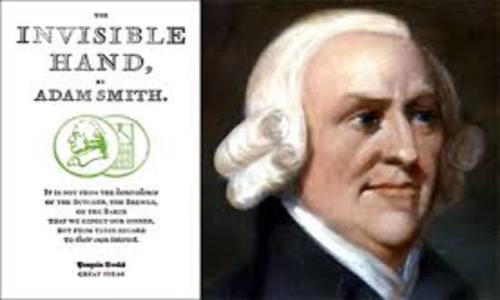The difference between the 'Market' in early liberalism and in contemporary neoliberalism
The distinction between the original liberal conception of 'the market' and the contemporary view of 'the market' reveals much about the way in which modern capitalism operates. The following is an excerpt taken from my PhD thesis. I hope this opens up a number of angles for discussion.

(Source: pqed.org)
In early liberal thought, the market was an economic entity distributing needs, wants, opportunities, and rewards within the economic sphere. This market was to be ‘left alone’ to distribute the rewards of an economically productive society in a fair manner of distribution. The market in this conception was virtually a ‘natural’ entity which would be disturbed if interfered with, particularly by the state. This is characterised by Smith’s famous notion of ‘the invisible hand’ of the market. The general idea was that the market, rather than the state or other governing entities, would be the arbitrator of rewards from the economic sphere. In this sphere, the state acts only to constrain the operation of the market (Smith, cited in Dean, 1999, p.114).
However, under neo-liberal rationalities of government, ‘market relations’ are emphasised instead of the ‘free market’. The general thrust of the argument is that markets for services, products and expertise need to be expanded as much as possible in order to provide the greatest possible choice for the ‘individual as consumer’ to buy these services, products, and expertise. Only through the consumer enacting their freedom, through choice on the market, can they contribute to the overall welfare of themselves and society in general (Rose, 2001, p.54). Unlike the earlier classical liberal notion of the state only being able to act as a constraint to the market, within neo-liberal rationalities of government, the state plays a very different role. Within neo-liberal discourses, the government plays an active role in creating the conditions for the ‘free market’ to operate to its maximum potential:
". . . modern forms of neo-liberalism define positive tasks for a governmental activism. Here it becomes a question of constructing the legal, institutional and cultural conditions that will enable an artificial competitive game of entrepreneurial conduct to be played to best effect . . . it is a question of extending a model of rational-economic conduct beyond the economy itself, of generalising it as a principle for both limiting and rationalising government activity. Government must work for the game of market competition and as a kind of enterprise itself" (Burchell, 2001, p.27).
Such a process extends downwards into the realm of the individual, as well as operating on a macro scale. For each individual to compete in the marketplace, it is a ‘duty’ of each citizen to attempt to become an ‘entrepreneur of the self’. For this to happen, the individual must be allowed full autonomy and freedom to be able to enact a full range of choices in the marketplace. The individual must learn to operate their lives as an ‘enterprise’, in the same way that a manager would run a business. Such an approach by each individual (in the ‘ideal’ situation) would mean having an efficient economy. This is the idea of building not only the economy but society in general from the bottom up. Building society from the transactions between individuals, without interference by the state, would theoretically allow for the goal of an efficient society to be realised. So the individual must, in all transactions of life, be efficient, on constant lookout for opportunity, self-regulating, ‘empowered’ to make choices, competitive, and flexible (Gordon, cited in Rose, 1999, p.230).

(Source: tourismtribe.com)
What I find interesting about this difference is the pathway towards individualism that we can see so clearly in our modern obsession with the 'self' and all things 'self' (self-help, self-regulation, self-control, and so on).
It appears that the original liberal conception of the market is that it was a 'thing' that stood outside of the individual. Instead, the modern conception of the market is infused within, and defused through, each and every member of society. In this way, after the last 40 or so years of neoliberalism (which we seem to be moving away from now), 'the market' has become a cultural phenomenon which is deeply embedded into the language and actions of the people in western society.
This post recieved an upvote from minnowpond. If you would like to recieve upvotes from minnowpond on all your posts, simply FOLLOW @minnowpond
Thanks.
@drrobertmuller Thanks for sharing your activities with finding up and jogging. The 1st yrs tend to be the hardest. We are at our for six yrs non-halt.Carry on Performing at it. Perseverance and exertions tend to be the keys to results.
Those are some intense words :D
Again, awesome writing and structure. I appreciate the effort your'e putting into your content.
Keep it up!
Thanks again @enazwahsdarb. Nice to get such positive feedback. I feel I'm on the right track in terms of quality.
Thank you @vm2904. I think this conception of the market has huge ramifications for modern life. It has even been said by some of our erstwhile leaders that every individual should run their life as if it is a business. This takes the human right out of "the social". Thanks for your comment.